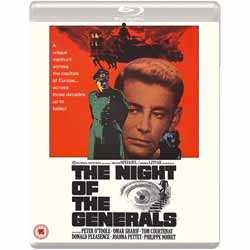|
Click here to return to the main site. Blu-ray Review
In a sharp, beautifully engineered 4K restoration, the 1080p presentation of Anatole Litvak’s The Night of the Generals reminds us all over again why we need to be grateful to Eureka for their state of the art technical standards. Director of Photography Henri Decai’s muted colours motivate without sizzle or garish postcardiness. Maurice Jarre’s score is… well Maurice Jarre paying homage to his favourite movie soundtrack artist, himself. We get this movie in its best form, better even than it looked when audiences saw it or shunned it in 1967. And there’s the rub, this film represents the tipping point for the downhill slide into the Red Sea of ink for one of the world’s greatest producers in film history: Sam Spiegel. Generals cost about $5.2 million to make and returned only a threadbare $1.8 million. So why do you want to own this Blu-ray? 1) it’s beautifully shot; 2) its great cast is never not fun to watch; 3) the psycho-pathology of Peter O’Toole’s serial slasher Nazi General Tanz is wonderfully creepy or creepily wonderful, depending on your point of view; 4) its story structure of parallel timelines is unique in the genre of crime films. It is point #4 that represents the Spiegel sensitivity. (He would again experiment with unconventional time lines in his last film, Betrayal (1984) based on the remarkable play by Harold Pinter.) The sleek screenplay by Joseph Kessel and Paul Dehn draws from a novel by German author Hans Helmut Kirst. The plotline begins with the insane butchery of a prostitute in the Warsaw maelstrom of 1942 while the Nazis are butchering people outside in the streets. A witness has peeked through a crack and watched the exiting killer stride down the stairs. He is German military but not just any rank, he’s a General. The red stripe on his pants distinguish him, something we’ve already seen in the title sequence’s fetishistic close ups. Military police inspector, Major Grau (Omar Sharif) is called in. This looms larger than all his other criminal investigations of bad Nazis and we see in his persistence a cop who believes in justice. Ironic in the midst of war. Two years later in 1944 there is another murder in occupied Paris and Grau is still on the case; this time working with a French investigator, Inspector Morand (Philippe Noiret). He tells Morand their killer wants to play God in bed as well as battle. Grau: ‘But I am going to demonstrate to him he is not God!’ Morand: ‘But you are?’ Grau: ‘My madness is on a smaller, more secular scale. I want to see justice is done.’ Morand: ‘Why?’ Grau: ‘It happens…’ Parallel to this conversation in Paris, 1944, leaders in the high command are planning to assassinate Hitler in Von Stauffenberg’s Valkyrie plot. As the countdown ticks to its climax, Grau is able to positively ID his killer general. This reviewer deserves a reward for not spoiling The Night of the Generals for first time viewers. Suffice it to say, a lot more happens. The story’s third timeline in 1965, which has only been sporadically visited so far, with beautiful transitions, now becomes centre stage. Another similar murder has just happened in Hamburg. O’Toole, who was a circumstantial suspect before, has just been released from war crimes prison. But there is a witness who can convict him, if he can be found. O’Toole’s performance is a wonderful study of a bottled up psycho. In the 1942 sequence Litvak gets to do a sprawling roiling massive scene of urban battle, the kind of giant choreography with people and vehicles that distinguished him in his 1951 classic, Decision Before Dawn. Standing in the back of his open sedan, impervious to the blitz of lead and shrapnel, Tanz comes rolling into the eye of the storm. Men around him die like flies but he has the same crazy luck Hitler will have when the Valkyrie briefcase explodes under the map table in 1944. There may not be a God but do daemons exist to protect those anointed as criminally insane? O’Toole and Sharif did not want these roles but succumbed to Sam Spiegel’s call to honour the career break he gave them with Lawrence of Arabia (1962). Spiegel knew the value of stars with talent and his films, successful or not, were always cast with first magnitude luminaries. His supporting roles were no less stunning. In Generals we get two future Bond villains, Charles Gray and Donald Pleasance. Not to forget Tom Courtney in a pivotal role as Tanz’s unwilling personal aide. His fiancé played by Joanna Pettet is strong and sympathetic, especially when she slaps her Wehrmacht mother played by the wonderful Coral Browne. And then there’s Christopher Plummer as Erwin Rommel, a far way from Captain Von Trapp in The Sound of Music (1965). All this praise must be tempered with the doubtful question of accents and the dramatic conceit of high ladder Brit actors playing Nazis. Yes, they all do it. Their larynxes find that special husky zone, certain vowels are over trumpeted, cadence becomes anti-traditional in that monotonously special way. Anglo hegemonists don’t see any problem with this at all but alas it all contributes to the film’s datedness. It’s the same problem with Ridley Scott’s Exodus: Gods and Kings (2014) where Welsh voices pop up in ancient Egypt, and God elocutes like a properly trained British theatrical boy. Only Anglophiles can’t find a problem with this in a world film market. Generals, in its cocoon of the past, is oblivious and will either be forgiven by the viewer or not. O’Toole’s voiceless face is worth forgiveness. And his eyes. This wonderful sicko performance evokes laughter, cringeworthy laughter. For that alone, I love it and you should too. 9 John Huff Buy this item online
|
|---|

